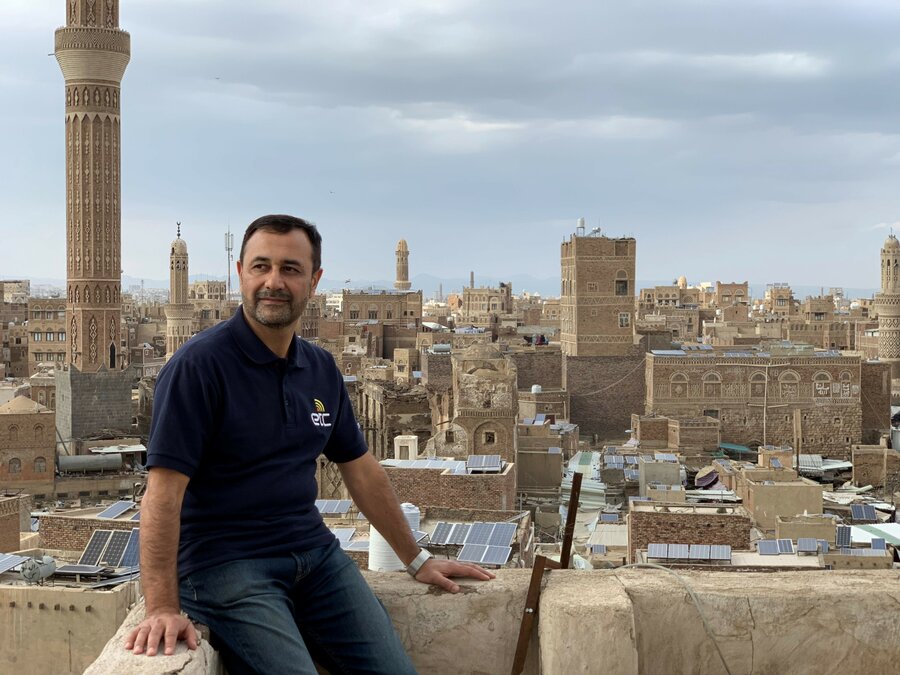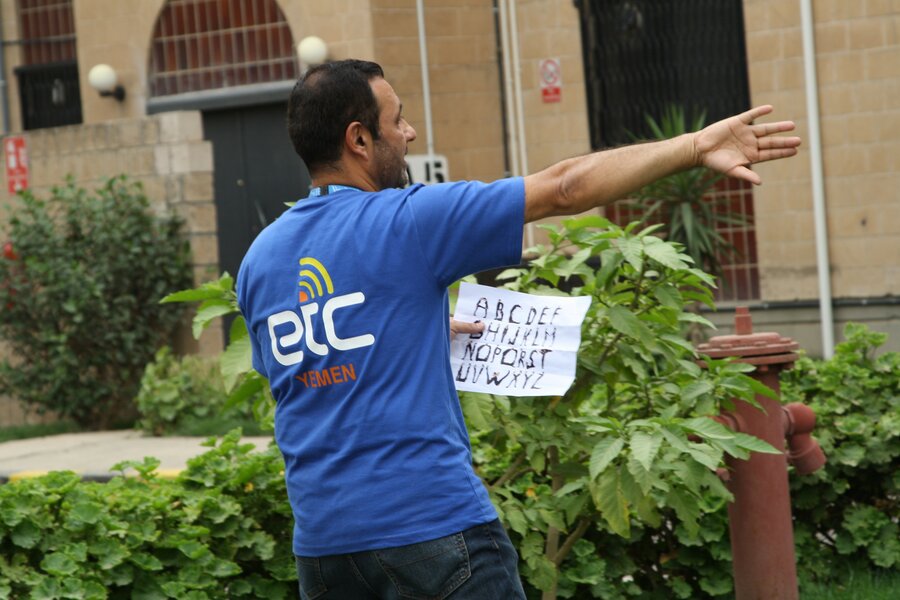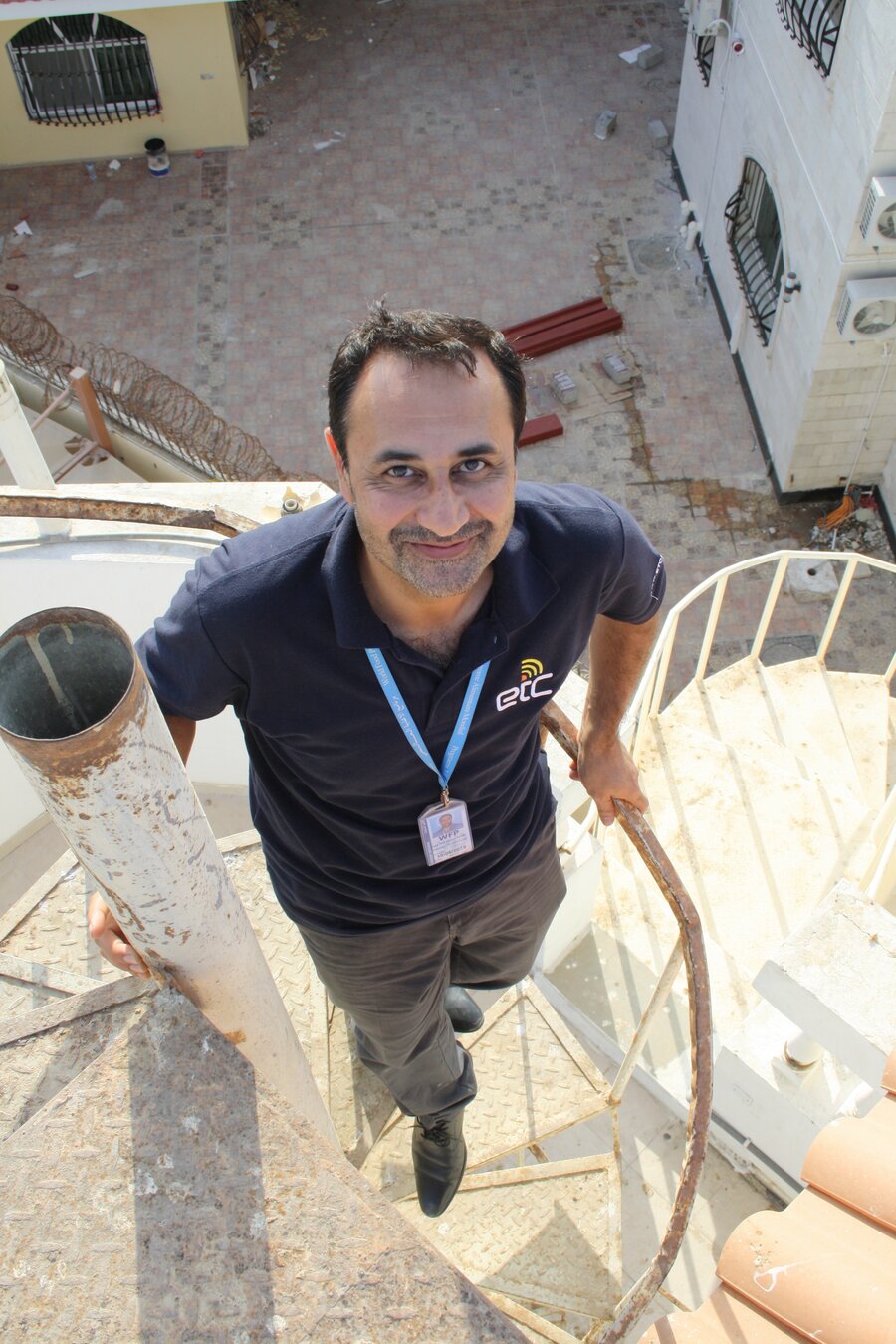Yemen connects

Yemen is struggling with conflict, the worst cholera outbreak in modern history, a deteriorating economy and a population that is one step away from starvation. Emergency Telecommunications Cluster (ETC) Coordinator Wali Noor talks about what it is like providing shared communications services for humanitarians working in the world's largest hunger crisis.
The departure hall of Sana'a International airport is almost completely silent and deserted. Duty free shops are closed, and white sheets cover the glass cases in which miniature models of the famous Sana'a houses sit covered in dust. There's no Wi-Fi coverage. In the final minutes before boarding the World Food Programme (WFP) plane bound for Amman, Wali Noor, the ETC Coordinator in Yemen, is still on the phone, sending emails and following up on actions. His work never stops. But today, Wali, originally from Afghanistan, is on his way home to see his family in north London for a much-needed break.
The war in Yemen has only exacerbated what was an already desperate situation in the country. Ongoing conflict has resulted in one of the worst humanitarian emergencies of our time, with millions of people — many of them children — on the brink of famine. Thousands of civilians have died and some 2 million are internally displaced.
It is against this harrowing backdrop that the ETC in Yemen delivers "lifesaving communications," by equipping humanitarian responders with basic security telecommunications and connectivity services.
In tangible terms, ETC services like Internet connectivity and radio enable staff in World Health Organisation (WHO) — run cholera centres to contact treatment facilities in remote locations, share medical information on each sick individual, and ultimately, track an outbreak. And in places like Hodeidah, where intense fighting continues to rage, the ETC provides the only available internet connectivity service to humanitarians; it is a very literal lifeline.
"It helps to keep this in mind amid an airstrike hitting or a day which is particularly hard."

For Wali, this is his second assignment with WFP, having joined the organization in Sudan in 2013. "Yemen has a different context because the situation is so unpredictable. Contingency planning is important here as there are lot of last minute changes and this is very demanding."
Despite the hardship of his surroundings, and often changing work environment, Wali enjoys his work. He wakes at five most mornings to exercise and clear his head before the day starts. With staff under strict curfew and unable to leave the compound after work, Wali also finds that sport lets him connect with colleagues.
"My wife said don't be sorry. Whenever you are home, that will be Eid."
"Being among those helping out millions of people is a great honour, especially when you hear positive feedback," says Wali. "It helps to keep this in mind amid an airstrike hitting or a day which is particularly hard. These days always make you think of your own family."
His eyes light up at the mention of family. The support Wali gets from his wife and four children is an enormous source of motivation. It boosts his morale when far from home, especially when he can't be present for family events, such as his daughter's graduation.
"She watches the news and knows what's going on. She was very happy, though, because she knew I had to be here in Sana'a to help. I was also here during Eid and couldn't go home so I had to apologise to my wife. My wife said don't be sorry. Whenever you are home, that will be Eid."
"When I see the scale of the humanitarian operation here, helping 8 million Yemenis, it makes me very proud. This is what pushes me to stay with the operation."
Once Yemen is peaceful and stable, Wali dreams of returning with his family to visit the country he currently calls his second home. For now, Wali concentrates on executing his part of the response in this devastating humanitarian crisis to the very best of his ability.
"When I see the scale of the humanitarian operation here, helping 8 million Yemenis, it makes me very proud," he says, his voice dropping. "This is what pushes me to stay with the operation. Personally, I wouldn't be comfortable leaving Yemen now; I'm not ready to leave. I'm very attached to the people, to the operation, to the culture."

"Everything else will go but that will remain. Knowledge will remain."
He has also helped drive the ETC's first ICT capacity building for local IT staff in Yemen — one in Aden and one recently in Sana'a. Local knowledge and capacity will form the foundation of future IT response in Yemen, long after international staff have gone.
"The level of commitment, engagement and attachment between the partners here, I'll never forget," says Wali. I hope when the time does come for me to leave, the opportunities to scale up knowledge and capacity will stay forever. Everything else will go but that will remain. Knowledge will remain."
Night has fallen by the time we leave the refuelling station at Jeddah airport and continue our route to Amman. Most people on the plane are either asleep or watching movies on their laptops. Light from the screens cast a blueish glow around the cabin. Wali can't sit still and is standing in the aisle with one foot resting on the seat, his laptop balancing on his knee. Still working, still planning. Even though he is on his way home, he still isn't quite ready to leave Yemen.
Led by WFP, the Emergency Telecommunications Cluster (ETC) is a global network of humanitarian, private sector and governmental organizations that work together to provide shared communications services in emergencies. The ETC seeks to ensure all those responding to emergencies — including affected communities — have access to vital communications services.
In Yemen, the ETC was activated in April 2015 to support humanitarian operations on the ground.
